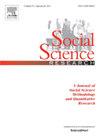Do minority inclusive institutions increase electoral support for radical-right parties?
IF 3.5
2区 社会学
Q1 SOCIOLOGY
引用次数: 0
Abstract
How do minority inclusive institutions that improve minority groups’ political access influence the electoral success of radical-right, anti-minority parties? I explore this question by analyzing the case of Croatia’s national minority councils, which were introduced to enhance ethnic minorities’ political voices at the local level. Using a difference-in-differences design with panel data, I find that the vote shares of radical-right parties became lower, if anything, in municipalities with a minority council. Further, analyzing georeferenced survey data, I show that the introduction of minority councils did not necessarily worsen the ethnic majority’s attitudes toward minority groups. These findings indicate that contrary to the institutional variant of group threat theory, inclusive institutions do not have to trigger electoral backlash among people in the majority. This point has important implications for institution design in multiethnic societies.
少数群体包容性机构是否会增加激进右翼政党的选举支持?
提高少数民族政治参与度的少数民族包容性机构如何影响激进右翼、反少数民族政党的选举成功?我通过分析克罗地亚国家少数民族委员会的案例来探讨这个问题,该委员会的引入是为了提高少数民族在地方层面的政治话语权。利用面板数据的差分设计,我发现激进右翼政党的得票率在设有少数民族委员会的市镇变得更低。此外,通过分析地理参照调查数据,我发现少数民族议会的引入并不一定会恶化多数民族对少数民族群体的态度。这些研究结果表明,与群体威胁理论的制度变体相反,包容性制度并不一定会引发多数人的选举反弹。这一点对多民族社会的制度设计具有重要意义。
本文章由计算机程序翻译,如有差异,请以英文原文为准。
求助全文
约1分钟内获得全文
求助全文
来源期刊

Social Science Research
SOCIOLOGY-
CiteScore
4.30
自引率
4.00%
发文量
0
审稿时长
65 days
期刊介绍:
Social Science Research publishes papers devoted to quantitative social science research and methodology. The journal features articles that illustrate the use of quantitative methods in the empirical solution of substantive problems, and emphasizes those concerned with issues or methods that cut across traditional disciplinary lines. Special attention is given to methods that have been used by only one particular social science discipline, but that may have application to a broader range of areas.
 求助内容:
求助内容: 应助结果提醒方式:
应助结果提醒方式:


